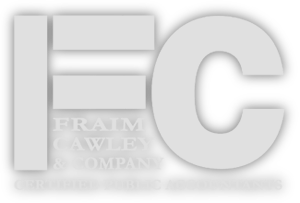Originally published August 26, 2013
Small business owners have always been subject to greater IRS scrutiny than other taxpayers. The lack of reported, irrefutable documentation combined with business owners’ tendency to be slightly…“liberal” with what they report makes the IRS more likely to take a second look at their returns. This is nothing new.
What is new – and something many small business owners are likely unaware of (and are grossly ill-prepared for) is an IRS program that started just this month. The IRS recently sent letters to roughly 20,000 small businesses questioning their accounting practices and revenue reporting. And that is probably not the last of these letters/inquiries that will be sent. Here is the premise under which the program works:
In 2008, the IRS was given greater access to business credit card transactions. They have been comparing those figures to what businesses are reporting on their tax returns. If the credit card receipts look unusually high compared to total revenue, the IRS is assuming that business taxpayers are underreporting cash transactions.
On the surface this might sound reasonable. Why would a business have 90% of their receipts via credit card? Is that really realistic? In practice, however, there are some issues that can cause very serious difficulties for small businesses.
“Mom and Pop” Businesses are Being Targeted
This initiative is looking specifically at the smaller, “mom and pop” type businesses. Smaller companies are often the ones with the least capital to spend. Because of this, they frequently have the least sophisticated accounting systems (if they even have a system at all!) They often attempt to get by with minimal professional help and may even try to do everything on their own. In short, they are the most at risk to have questionable records/accounting and are the least able to defend themselves if the IRS does raise questions. On both counts, small businesses are the most vulnerable.
Inconsistencies are Sometimes Justified
The letter asks taxpayers “to explain why the portion of [their] gross receipts from non-card payments appears unusually low.” This is predicated on the theory mentioned above that a certain percentage of sales can reasonably be expected to be paid with cash. But there are a number of things that can and will legitimately skew the ratio
Credit card sales are reported as a gross figure to the credit card company including sales taxes. But the sales tax portion is not treated as revenue to the merchant from a tax standpoint, so it is excluded on the tax return. That creates an instant discrepancy. And by nature, many larger, higher dollar transactions are more likely to be charged with a credit card instead of cash. Think of buying a cell phone or computer. You probably didn’t bring $200-$1,000 in cash into the store to buy the main product. But when you had to buy a $20-$50 accessory the next week, you might have just paid with the money you had in your pocket. So cash sales are skewed to lower dollar items and card use is skewed toward higher dollar purchases – creating a perfectly legitimate reason for the “higher-than-average” credit card sales
The Method the IRS Uses is Not Fully Disclosed
The items I mentioned above are some things that could upset the IRS’s algorithm. But I cannot tell you if they have tried to factor these things in or have neglected to consider them entirely. Why? Because the methodology has not been disclosed. We know that the credit card records come into play, but not much else aside from that. The letter the IRS sends does not even specify why they believe the receipts are underreported. It is difficult to stand accused without knowing what evidence you are trying to refute, isn’t it?
You are Guilty until Proven Innocent
Well, not exactly. But the IRS is sending the letter because they have reason to believe that you have not reported all of your cash sales. Read: the burden of proof is on you to prove that you did report all sales. This will require a lot of time, expense, and very likely stress for the business owner. You have to dig through all of your records and accounting systems to justify what you reported. And since you do not know why the IRS suspects you of wrongdoing or what proof they have, you will likely need to hire a lawyer or tax accountant to assist you – calling on a professional to help “put out the fire” as it were, trying to manage a crisis situation, put together proper records (perhaps after-the-fact), make some sense of your books, and so forth.
And do we honestly believe that this is the only idea that the IRS has in mind to target small business? If you do, I’ve got a bridge in Brooklyn and some swampland in Florida I’d like to sell you. My experience tells me that more of these initiatives targeting small business are likely to be on the way.
What Can You Do?
The key to avoiding IRS suspicion is careful compliance and avoiding mistakes that raise the IRS’s interest in your business and your taxes. That seems pretty simple, but it is far from it. The 2013 federal tax code is nearly 74,000 pages long! Without professional help, compliance is nearly impossible. For small businesses in particular, it is sometimes tempting to try to save money by scrimping on professional services. But as the old expression goes, it is never wise to be “penny wise and pound foolish.” The relatively modest cost of professional guidance will likely be paid many times over by real savings on taxes, penalties, and by improved business results – not to mention productivity losses when time is taken away from the core, money-making aspects of your business. Especially with this latest targeting of small businesses, there are several professional services I highly recommend:
- Bookkeeping. Having all of your records in order is a huge help for every part of your business, especially tax matters. It ensures that your tax returns are properly completed (and thereby less likely to raise any IRS red flags). And if you are the subject of IRS investigation, your records will be the focal point of your defense. If the IRS comes knocking, poorly organized, improperly structured, or incomplete books and records are an invitation for deeper digging, increased scrutiny, and more suspicion.
- Advisory Services. Not able to afford full bookkeeping services? No problem. We can set up a periodic review of your records. This will include transaction cleanup, our ongoing analysis to identify appropriate tax and business strategies, a consideration of the financial health of the company, and a review for proper IRS compliance.
- Tax Services. Both filing and planning. This will not only allow you to minimize your tax burden but also help to ensure that there are no red flags in the return itself. And if the IRS does have any questions, you will have a professional on your side to justify your legitimate position and defend you!
Especially with the recent policy change and increased scrutiny on small businesses, business owners cannot afford to be without professional help. It is an investment that pays dividends for years to come. Trying to avoid the expense in the short-term could cost you dearly in the end.
Please visit me online at FraimCPA.com or call me at (540) 314-0345 to schedule your free consultation.
IRS Circular 230 Notice: To ensure compliance with requirements imposed by the IRS, we inform you that any federal tax advice contained in this communication (including any attachments) is not intended or written to be used, and cannot be used, for the purpose of avoiding penalties under the Internal Revenue Code.




